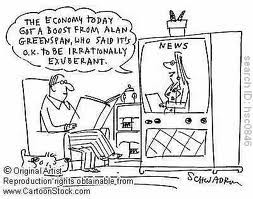“Irrational Exuberance”: The Case of the MOOCs
Federal Reserve Board Chairman Alan Greenspan said in 1996 that the high-flying stock market was an instance of “irrational exuberance.”
 Nearly two decades later, were he so inclined to inspect the swift expansion of elite universities into sponsoring Massive Online Open Courses (MOOCs), he might have said pretty much the same thing.
Nearly two decades later, were he so inclined to inspect the swift expansion of elite universities into sponsoring Massive Online Open Courses (MOOCs), he might have said pretty much the same thing.
Certainly, there is “exuberance.” The hype, the constant flow of words like “revolutionary,” “transformational,” speak to university officials becoming trumpeters for expanding the reach of top-notch professors and brand-name institutions into every corner of the world where there is an Internet connection. The inspired hopes of university-based entrepreneurs to monetize these courses and bring in fresh dollars drives some professors to leave tenured positions and start new companies. The dream of pedagogically-driven faculty to use MOOCs to spread their expert knowledge to thousands of hungry students and, at the same time, enhance student-
 Nearly two decades later, were he so inclined to inspect the swift expansion of elite universities into sponsoring Massive Online Open Courses (MOOCs), he might have said pretty much the same thing.
Nearly two decades later, were he so inclined to inspect the swift expansion of elite universities into sponsoring Massive Online Open Courses (MOOCs), he might have said pretty much the same thing.Certainly, there is “exuberance.” The hype, the constant flow of words like “revolutionary,” “transformational,” speak to university officials becoming trumpeters for expanding the reach of top-notch professors and brand-name institutions into every corner of the world where there is an Internet connection. The inspired hopes of university-based entrepreneurs to monetize these courses and bring in fresh dollars drives some professors to leave tenured positions and start new companies. The dream of pedagogically-driven faculty to use MOOCs to spread their expert knowledge to thousands of hungry students and, at the same time, enhance student-
